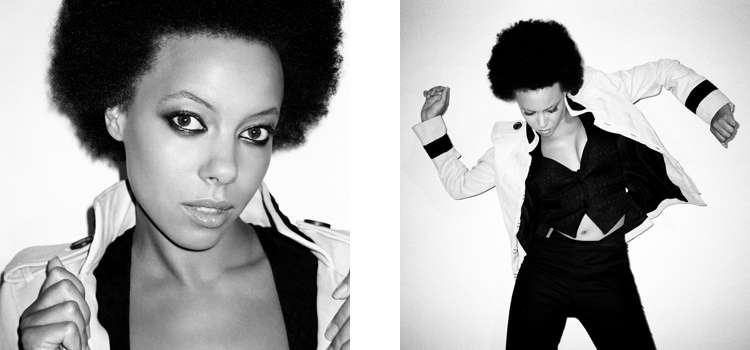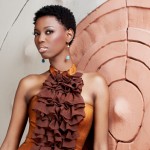
A neat, chic afro; a distinct accent swirled in tints of British and Nigerian tones and perhaps something else pulsate from her songs. Think pop, but one stroked with waves of jazz and electronica, soul and rock all on one album. Adama Claire Susan Roberts, simply known to fans as Adama, excitedly describes Delicate Dragon, her debut album to be released in Fall 2007, as her “baby.”
The album’s beautifully designed artwork of pink and yellow dragons floating around ornate flowers not only draws you into Roberts’ personality, it also primes you for a very fascinating album. “Delicate Dragon is my emotion about another person and so it’s kind of strong and fierce but at the same time it’s fragile, vulnerable,” she says with a tint of humor at what she considers to be an interesting way of coming up with an album title.
“It’s a stream of consciousness when I’m writing. I tend to listen back to the lyrics after I’ve written the songs and realize what it is I was writing about,” she says and describes the message of the album: “It’s about transformation, kind of letting go of the old, moving to the new and moving through your fears to what you’re born to be.”
Born to a Cornish father and Nigerian mother, Adama grew up in the UK where she was raised by her mother. “It was quite interesting living in London, as a single parent mom from Africa,” she stresses the “A” in a distinct cadence and continues to say with a laugh, “It was quite hard because I mean, I had like the thickest accent so it was really hard for people to understand me sometimes.”
There is some sort of strength exhibited in her songs in a very realistic and perhaps even empowering manner that gives one a sense of her character—fragile and vulnerable yet strong and fierce like she describes the meaning behind the album title.
As a child, Adama admits to experiencing the ugliness of racism. “My struggle is quite interesting because I was very secure in my identity. It was never an issue that I was half black and half white but it is interesting to me that it was an issue for other people,” she says. The unpleasantness of such an attitude was something she had to live and struggle with while growing up, but none of that vengeful tone can be heard in her voice as she speaks about her career aspirations.
“My big goal is to take [my music] as far as God would let me take it,” she laughs, “There’s no stopping.”
Like many independent artists not yet signed onto major labels, Adama is diligently weaving her way through the masses. She has collaborated on an album with Tuatara, a Seattle-based instrumental music group, which will be released in September 2007. Roberts co-wrote and performed on three songs for the group’s forthcoming album since their four year hiatus. She also recently shot a video for her first single “Show me the Exit” in Israel and is now based in New York where she will be performing shows and promoting her album.
Such a stage shows her progress as an artist from 10 years ago when she decided to make singing and songwriting a profession and began to devote all of her time to it. Though she began singing at a very early age, pursuing it was not something she thought she would do. “I’ve always sang really strange because I’ve never lost my accent when I sing, I kept it with me,” she speaks of an attribute clearly unmissed in her songs. Although different, her accent becomes a great addition to the music’s euphonic tunes.
Adama asserts she does not separate the words “singer” and “songwriting” because she believes they go together and also because music is more than a form of art to her. “I dream my songs and I have been doing that since I was three years old. I dream and wake up, and write it down on like a computer sequencer,” she says, “Yeah, all the parts, I dream, like the guitar, the strings, the drums, everything. And so I arrange them, and my producer Gili Wiseburgh makes it a reality.”
Her love for world music is evident in her songs, which may be difficult to classify under a specific genre, though pop seems to be the dominant sound. Her influences range from Reggae and African music, which she picked up from her mother, to classical and Western pop, like the Beatles, which she experienced with both parents. “I had quite an enigmatic exposure to music…it could be Egyptian pop. I can listen to heavy metal, I can listen to soul,” she says.
Though her songs are not dominated by African rhythms there are hints of them in a few. In fact, a track on her upcoming CD called “Hanniman” unknown to her contained Nigerian influences, something brought to her attention by an ethnomusicologist. “That was quite a bit tough,” she says, perhaps considering how effortless it was to create such rhythms.
Adama, who has only stayed in Nigeria over a 3-week period excitedly describes her experience as memorable: “It was just so amazing to go back there and reconnect with another part of myself,” she expresses. Even with little knowledge of the Igbo language, she has managed to say greeting words and others like “I love you,” which she uses during communications with her grandmother. “I know a few swear words,” she laughs out loud, “nothing fluent, unfortunately. As a child I really wanted to know but it didn’t happen.”
For those wondering how old this versatile singer/songwriter is, continue to speculate because she is not sharing that. “I keep people guessing on that one,” she laughs and says, “But my birthday is 21st of November.”
Adama describes herself as a very passionate person who tends to stay true on her course. “I have one goal and I go for it with all my heart without worrying about failing and I see myself as a creative individual, and letting it flow,” she says.
As a former martial artist who once competed in Britain and Hong Kong in a very physical specialty called Butterfly Knife, she now directs that energy to belly dancing, which she admits to be absolutely crazy about.
“I love reading books, I know it sounds kind of corny, a bit cliché, but I love spiritual books or anything that vibrates through where I’m at spiritually, it helps expand my consciousness,” she says. Some of that consciousness is clearly evident in her music.
Although Adama’s ardor extends to other interests, music seems to be of paramount importance and a focal point in her life. “[My passion] is music, all music and just keep dreaming of songs. I just want to be alive long enough to write my dreams so that I can share them with everybody else,” she adds.






